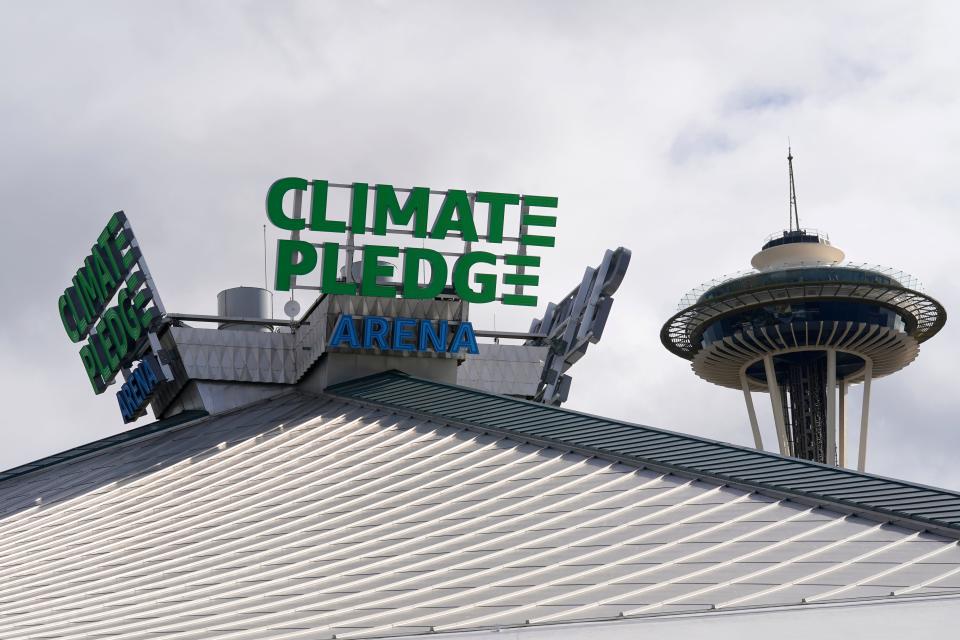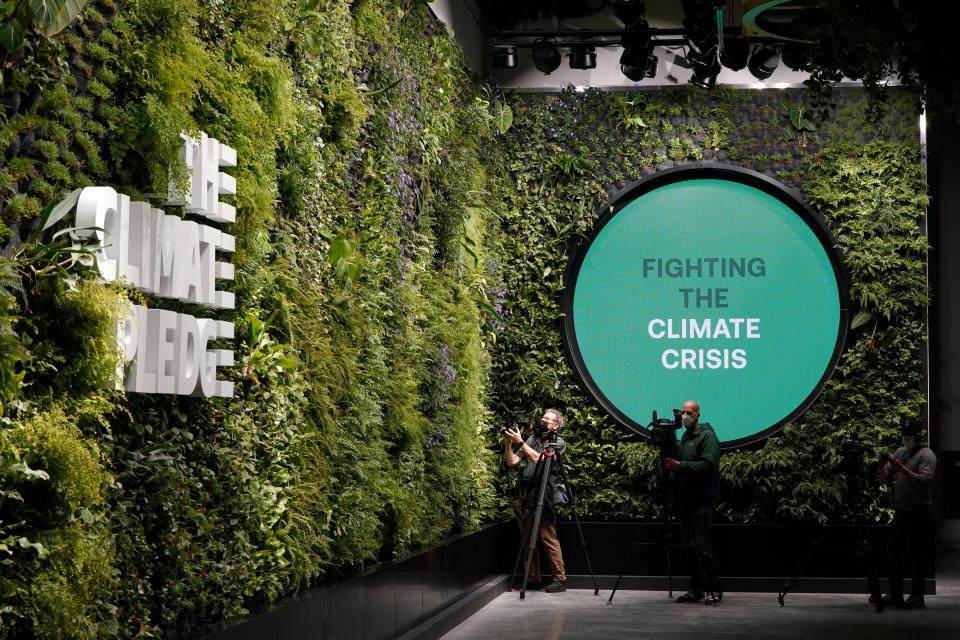Seattle Kraken's new home is a stunning achievement as world’s first net-zero carbon arena
When the referee drops the puck for the first faceoff in the first game for the NHL’s expansion Seattle Kraken at Climate Pledge Arena, the ice will be made from recycled rainwater.
Instead of a gas-fueled Zamboni, the ice-cleaning vehicle will run on electricity, as will the lights, scoreboard, kitchen grills and fryers and heavy-duty dryers for hockey gear — all powered by renewable energy from nearby solar farms.
Single-use plastics will be eliminated at Climate Pledge Arena, and instead of arena food going into a dumpster at the end of a game or concert and creating more waste, it will go to shelters and food banks in the area.
These are not symbolic efforts. Oak View Group, which owns and operates Climate Pledge Arena, proclaims the venue will be the world’s first net-zero carbon arena in the world following the stringent guidelines of the International Living Future Institute.
“The reason we’re passionate about this — and everyone should be passionate about it — is we have an obligation to our grandkids to make a difference, and if we don’t do it soon, we’re not going to be able to fix this,” Oak View Group co-founder and CEO Tim Leiweke told USA TODAY Sports.

The recent United Nations climate change report warned of a catastrophe, calling rising temperatures around the globe a “code red for humanity.” Though he doesn’t consider himself an environmentalist, Leiweke was moved in part by Sir Richard Attenborough’s documentary "Breaking Boundaries: The Science of Our Planet."
“I consider myself late to the party,” Leiweke said, “but intelligent enough now to understand the desperate situation we are in.”
Leiweke isn’t naïve either. Climate Pledge Arena won’t save the planet. Yet, doing nothing is not a solution.
“Climate Pledge Arena does not solve global warming,” Leiweke said. “It helps, but on its own, it’s just a speck. We get that. But from an inspiration standpoint, we’re going to move millions and millions of people through the building. We’re going to inspire tens of millions of people. That is our goal. That is our platform. That is our mission statement. That’s how we can help.”
Leiweke is a longtime sports and entertainment executive, serving as president and CEO of Maple Leaf Sports (Toronto FC, Maple Leafs, Raptors) and Entertainment and president and CEO of AEG, a major operator of sports and entertainment venues.
“I want to go find a way to build the best development company ever and have a compass where we can make a difference and there’s one area where we all have to make a difference now and that’s our planet," he said.
Oak View Group is also responsible for the development of the new UBS Arena at Belmont Park in Elmont, New York. It’s where the Islanders will play and other entertainment events will take place. Scheduled to open in November, UBS Arena is expected to become the most sustainable arena on the East Coast.
Leiweke is adamant other venues can become, if not carbon zero, sustainable and reduce their carbon footprint. Are there additional costs? Is it difficult? Yes and yes. Can the arena still be profitable? Yes.
“We can build a mission platform and still get a rate of return for my partners,” Leiweke said. “You can still be in business. You can still be in business and you can be sustainable. Those two can live and be compatible with one another.”
'Find ways to inspire people'
Leiweke talks about the environment with an evangelist’s urgency. This is just a different kind of saving. Leiweke gets his inspiration from different and unlikely corners — Attenborough, Eddie Vedder, Billie Eilish, Michael Milken and Jeff Bezos, the Amazon founder whose company bought the naming rights to the Seattle arena, where the Kraken, WNBA’s Seattle Storm and perhaps one day, an NBA team, will play.
Leiweke credits Bezos for ensuring the name to the arena pushes a vital cause.
“I know many people have opinions on Jeff,” Leiweke said, adding, “He’s really the one who turned us on to climate pledge and sustainability. They taught us why this is important and then why we could do it and why not to listen to everyone who told us we couldn’t.”
Leiweke and architects didn’t start with a blank slate — the arena is the old Key Arena where the SuperSonics played. They kept the roof, three sides of the old building and renovated, including tearing out gas lines – a $50 million decision – so the arena can meet the qualification of zero carbon.
To be considered carbon neutral, the arena must:
► Eliminate fossil fuels;
► Have renewable energy resources;
► Obtain remainder of energy from other renewable sources;
► Provide a detailed accounting of carbon emissions of the buildings operations, and sow evidence those are being offset.
“This is the most critical decade where we have to take action, and we have to find ways to inspire people to really understand the urgency,” said Rob Johnson, vice president of sustainability and transportation for the arena and Kraken.
When searching for a new arena project, Leiweke had Seattle at the top of his list mainly because it would be home to winter pro sports teams, and NHL and NBA were possibilities with the right arena. Makes sense, but when Leiweke talked to Milken, the billionaire, philanthropist and white-collar criminal gave him another reason to focus on Seattle: rain.
Water is a scarce resource in the West but not in Seattle. They made the decision to use recycled rainwater to make the arena’s ice.
The first three-quarters of an inch of ice came from the city’s water supply. Every layer of ice after that is recycled rainwater. One quarter of the 160,000 square foot roof captures the rain, and a gutter system deposits the water into a 15,000 gallon cistern buried underneath the arena plaza. The cistern is connected to pipes and that jet ice system used to filter impurities and the water goes into the Zamboni.
“The mineral content coming from rainwater is higher than the city supply and actually makes ice easier to make,” Johnson said.

The process is expected to save the city 50,000 gallons of water annually, and eventually fans will be able to donate recycled rainwater for the ice, Johnson said.
“Rain is a good thing,” Leiweke said. “Let’s think about water as our greatest resource and how do we preserve it and how do we get the community to come together and celebrate? No better way than making ice. It becomes a spiritual moment to rally the community.”
Going electric was not easy. To meet the ILFI carbon-zero standards of no fossil fuels, contractors had to rip out gas lines.
They had to convert the Zamboni to electric, turn industrial dryers into electric and when it came to a state-of-the-art air-filtration system that is necessary in the COVID-19 pandemic, the giant fans that keep air circulated also had to be converted to electric.
The arena uses nearby solar farms and tapped into Amazon’s solar farm to ensure the building is powered by renewable energy.
Along the way, Leiweke heard contractors tell him “Can’t do it,” and he replied, “Yes we can. Figure it out.”
Just west of Climate Pledge Arena is Puget Sound, the largest estuary in the region, and microplastics have a damaging impact on the sound’s marine life.
“It’s a real commitment to eliminate single-use plastics because of the environmental harm it does to our natural environment,” Johnson said.
Leiweke called the reduction and eventual eliminated of single-use plastic “the hardest part of our sustainability platform by far.”
He was inspired by Billie Eilish and her tour just before the COVID-19 pandemic. “She asked every arena to on the night of her show to eliminate single-use plastic in the arena,” Leiweke said. “Because she’s so hot and it’s so important to get a Billie Eilish date in arenas, everyone figured it out. Everyone’s saying can’t do it. For one night, everyone started figuring out.”
'We need to feed people'
Leiweke went to his food and beverage providers (Delaware North, Pepsi and Coors) and found solutions: reusable and recyclable aluminum cups for draft beer and soda and aluminum cans for beer and wine and eventually water. Fans can also bring their reusable bottles and fill them at water stations throughout the arena.
Forks, spoons, plates, bowls will be either biodegradable or compostable. The arena will have traditional garbage cans to start as fans becomes educated, and those garbage cans will be phased out over time. Climate Pledge Arena wants to become 100% free of single-use plastics by 2024.
“We want to make it easy: anything you would eat you can throw in compostable bin and anything drink throw into recyclable bin. That’s our overarching goal,” Johnson said.
The next step in managing waste involves the influence of iconic Seattle institution Pearl Jam. Vedder and the band have raised millions for homeless and hunger casuse in the area. Leiweke was inspired again. While the goal for the kitchen staff is to avoid excess leftover food, food that can be saved at the end of event will be donated to Food Life which will get it to food banks, shelters and meal programs in Washington.
The Kraken also have committed to donating hours in the arena’s commercial kitchen to prepare meals for food banks and individual delivery.
“Eddie Vedder and Pearl Jam were right. We need to feed people,” Leiweke said. “This can be a cause. This can be a mission statement. This can be a moment and if there’s a city where this really hits home, it’s Seattle.”
No one person or entity will solve the climate crisis. It’s a collective effort, and sustainability walls will combine green living with educational information.
“It’s Climate Pledge Arena," Leiweke said. "If we’re ever going to make the moment, we’re going to make the moment now. ... We’ve got to solve it in the next 10 years or we’re done, we’re cooked. The urgency of his message is if we don’t start now, the planet will die and there’s nothing we can do to save it."
This article originally appeared on USA TODAY: Seattle Kraken's Climate Pledge Arena beyond environmentally friendly
